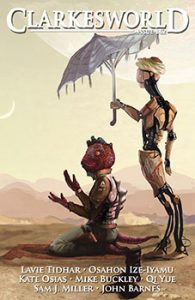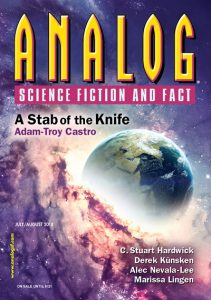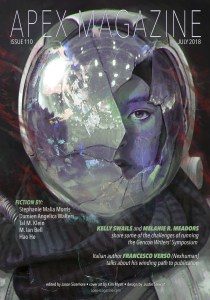Each month, Daniel Haeusser reviews short works of SFT that appear both online and in print. He is an Assistant Professor in the Biology Department at Canisius College, where he teaches microbiology and leads student research projects with bacteria and bacteriophage. He’s also an associate blogger with the American Society for Microbiology’s popular Small Things Considered. Daniel reads broadly in English and French, and his book reviews can be found at Reading1000Lives or Skiffy & Fanty. You can also connect with him on Goodreads or Twitter.
 “To Fly Like a Fallen Angel” by Qi Yue, translated from the Chinese by Elizabeth Hanlon
“To Fly Like a Fallen Angel” by Qi Yue, translated from the Chinese by Elizabeth Hanlon
Clarkesworld #142
Li Yaya was born and lives in an underground city, a community she is taught exists ten kilometers below the East China Plain, isolated from a surface rendered post-apocalyptically uninhabitable by radiation. Her life includes acceptance of this condition, and the frequent earthquakes that rattle the enclosed city. Balancing the sense of imprisonment, humans have become artificially genetically adapted to flight and enjoy the freedom of soaring through their boxed home. A meeting with a former boyfriend alerts her to a possible dark secret above them: a population of humans kept enslaved by city powers to keep things running, and a surface that may not be radioactive or dangerous after all. Yaya sets out to uncover the truth and discovers a situation that will likely surprise both her and readers. A lot of this story’s success rides on the surprises afforded by its ending, and so I have mixed feelings about it. The dialogue often feels stilted, and a lot of the scientific explanations given in the text are hard to swallow. Even where the twist ending clarifies matters, it also invites more uncertainties. But if one is willing to read without asking a lot of questions, it provides a clever and entertaining post-apocalyptic tale.
 “Render unto Caesar” by Eduardo Vaquerizo, translated from the Spanish by Rich Larson
“Render unto Caesar” by Eduardo Vaquerizo, translated from the Spanish by Rich Larson
Analog Science Fiction and Fact Vol. CXXXVIII #7/8
Surprise endings seem to be a common theme in the translated selections published this month. In this story I saw the big reveal coming well in advance, through the multiple clues left by Vaquerizo from the very start. Nonetheless, I adored this short story of an elderly, corpulent former priest who battles the question of whether he has been truly forgiven for his horrific sins of the past. If God has forgiven, but humanity has not, what does that mean? I personally appreciate speculative stories that delve into theology, so I found this an intriguing case on that level. The story also holds interest around the theme of crime and punishment and biological alterations that could enhance empathy and/or suffering. My most recommended translated short of the month.
 “All Clear” by Hao He, translated from the Chinese by R. Orion Martin
“All Clear” by Hao He, translated from the Chinese by R. Orion Martin
Apex Magazine #110
No plot or character surprises in this story, but like “To Fly Like A Fallen Angel,” another science fiction adventure story set in a futuristic semi-isolated community formed amid post-apocalyptic ruin. Zhang Dong’s village exists in a crumbling skyscraper, surrounded by other villages each defining themselves after the “collapse of the old order.” Dong gives each of these neighboring communities a nickname based on the prime pursuits or values that brought them into formation. Now, some of these rival groups have penetrated his village and Zhang Dong must figure out how this has occurred, and with the help of friends and families across generations find a way to save the village. Beyond the plot the major thread of the story is comparison between the relationship between Zhang Dong and his father and between Zhang Dong and his son, Zhang Fangfang. The story flows well to its resolution, with a strengthening of familial bonds, but ultimately it didn’t feel particularly special. One section of the text I may use in intro biology as an example of how evolution doesn’t work. It is unclear whether it is the author who is confused on this, or if it is just the character. Regardless, the inclusion of a possible “spontaneous mutation allowing [many children of the new generation] to send and receive brain waves” is an element that could have used better development.
